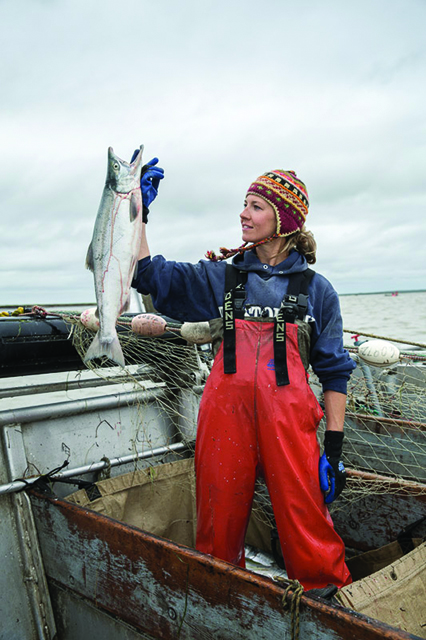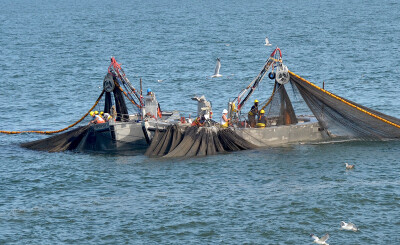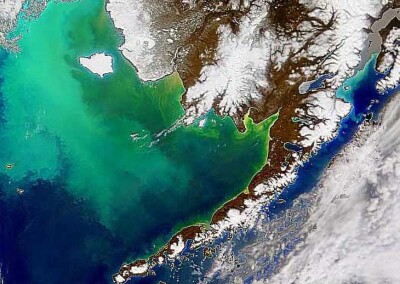The U.S. Army Corps of Engineers submitted a letter to the Pebble Partnership on Monday, Aug. 24, notifying the company that its project is not permissable under section 404 of the Clean Water Act as currently proposed. The partnership has 90 days to submit a mitigation plan.
A release from the U.S. Army's public affairs office noted that "as currently proposed, the project could have substantial environmental impacts within the unique Bristol Bay watershed and lacks adequate compensatory mitigation."
"It is impossible for Pebble to mitigate the devastation this mine will have on our Native cultures, our way of life that has been sustained for thousands of years by the pristine lands and waters of the Bristol Bay watershed," said Alannah Hurley, executive director of the United Tribes of Bristol Bay. "Pebble should not move forward in this process and should not be built."
The letter to the Pebble Partnership adds that the Army Corps determined the adverse impacts "to aquatic resources and… significant degradation to those aquatic resources" would be the result of "discharges at the mine site."
These concerns have long been voiced by local fisheries advocates, Alaska residents and the region's Tribal representatives. Until early August, the tide seemed to be running out on the mine's critics. That's when Donald Trump Jr. tweeted support for Bristol Bay's wild salmon habitat.
“Today’s decision by the Army Corps not to green light Pebble’s permit and instead require a mitigation plan for this project was refreshing and positive news to our fishermen and a huge step in the right direction,” said Commercial Fishermen for Bristol Bay Director Katherine Carscallen.
The Pebble Partnership has 90 days to submit a compensatory mitigation plan, at which time it will be reviewed by the Army Corps Alaska District to "determine if the amount and type of compensatory mitigation offered is sufficient to offset the identified unavoidable adverse impacts to aquatic resources and overcome significant degradation at the mine site," the letter states.
“Bristol Bay’s commercial fishermen applaud the Army Corps and Alaska Sens. Lisa Murkowski and Dan Sullivan for making a commitment to safeguard the world’s largest wild salmon run. Alaska’s senators have repeatedly made it clear that the project would need to pass a very high bar to advance through permitting, without trading one resource for another,” said Andy Wink, executive director of the Bristol Bay Seafood Development Association. “This determination highlights the extensive damage the Pebble Mine would have on salmon habitat.”
Alaska's senators released statements in support of the decision.
“I understand, respect, and support this decision," said Alaska Sen. Lisa Murkowski. "I agree that a permit should not be issued. And I thank the administration for its commitment to the protection of this world-class watershed and salmon fishery.”
"I have been clear that given the important aquatic system and world-class fishery resources at stake, Pebble, like all resource development projects in Alaska, has to pass a high bar – a bar that the Trump administration has determined Pebble has not met," said Sen. Dan Sullivan. "I support this conclusion – based on the best available science and a rigorous, fair process – that a federal permit cannot be issued."
The lack of sound science and data in the economic impact statement has been called into question primarily by longtime critics of the mine.
"We are thankful the Corps has come to the same conclusion as the rest of the scientific community, that Pebble will have such severe impacts there is no way to mitigate the destruction it will cause," Hurley said.
The "direct and indirect impacts at the mine site total 2,825 acres of wetlands, 132.5 acres of open waters, and 129.5 miles of streams," the letter states, adding "460 acres of wetlands, 231.7 acres of open waters, and 55.5 miles of streams" for "direct and indirect impacts associated with the transportation corridor and port site."
“Alaskans have agreed for years that trading 14,000 American fishing jobs in favor of a foreign-owned mine is unacceptable,” said Robin Samuelsen, a veteran Bristol Bay fisherman in Dillingham, Alaska. “Today the Army Corps made it clear they agree, and now we just need Alaska’s leadership to stand with Alaskans and support final and permanent Clean Water Act protections for Bristol Bay.”







